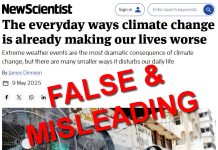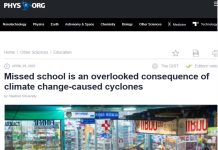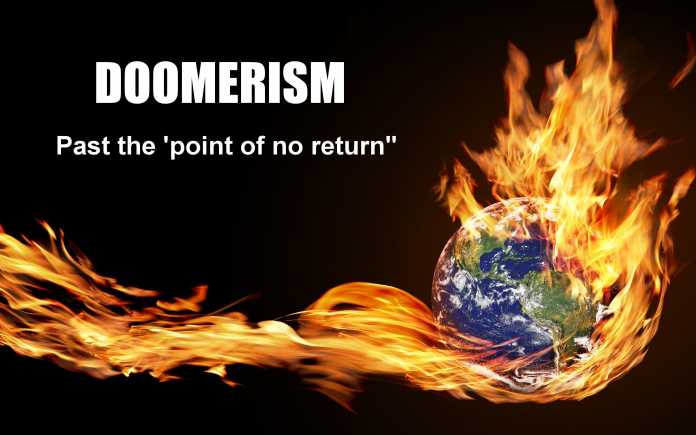Guest Post by Mike Hulme
Via Roger Pielke Jr.’s Substack: https://rogerpielkejr.substack.com/p/from-idealism-to-realism, introduction reposted from Marc Morano and Climate Depot:
Mike Hulme, Professor of Human geography at Cambridge University. Mike is one of the world’s most accomplished climate scientists. Hulme participated in the IPCC second and third assessments, was part of the Climatic Research Unit at the University of East Anglia, where he subsequently founded the Tyndall Centre for Climate Change Research at UEA. He has been at Cambridge University since 2017. … Mike’s publication record is expansive and involves many collaborators around the world. He maintains an active website where you can find his research and commentary.
Starting in the early 1980s, I have spent my entire professional life studying climate change, as well as teaching, writing and speaking about it in universities, conferences, and public forums around the world—in 43 countries at the latest count. With such a professional and personal investment in the idea of climate change, it is not surprising that for a long period I uncritically absorbed the notion that climate change represented the pre-eminent challenge facing humanity in the twenty-first century.
Since first immersing myself in the topic in the 1980s, and subsequently being part of the scientific and public story of climate change in the 1990s and 2000s[4], I was easily convinced that the growing human influence on the world’s climate would be a reality that all nations would increasingly need to confront, a reality to which their interests would necessarily be subservient and that would be decisive for shaping their development pathways. For more than half of these 40 or so years, it seemed to me self-evident that relations between nations would forcibly be re-shaped by the exigencies of a changing climate.
But now, in the mid-2020s, I can see that I got this the wrong way round. And I can also see why this was so. Rather than geopolitics having to bend to the realities of a changing climate, the opposite has happened. The unyielding force of political realism—the pursuit of the changing and unpredictable interests of nations and great powers—means that the framing, significance, and responses to climate change need continually to adapt to shifting geopolitical realities. Except that too often they haven’t. Whilst the world’s climate has undoubtedly changed over these 40 years, the geopolitics, demography, and culture of the world has changed even more.[5] Too often the language, rhetoric, and campaigning around climate change remains wedded to a world that no longer exists.
***
The crucial period which shaped my own (mis-)reading of the prospective power and salience of climate change in the twenty-first century—and many other people’s mis-reading; I was not alone in this—was the ten years between 1985 and 1995, now more than a third of a century ago. This period marked the apogee of optimistic thinking about “a new world order”—in the words of George Bush senior—and about “the end of history”—in the words of Francis Fukuyama. It was marked by the rise of market globalization, the triumph of liberal democracy over state-sponsored communism, and the blithe promise of a world energy transition. In short, this optimism was fueled by the rise of globalism; thinking strategically about climate change was caught-up in this zeitgeist.
It was during these ten years that the dominant public narrative of climate change took shape, what Dan Sarewitz later called “the plan”.[6] “The plan”, according to Sarewitz, had two components: one, that scientific knowledge about climate change would lead to action by compelling a convergence of people’s worldviews around the need to take action; and, two, that this convergence of understanding would translate into a consequent convergence around what needs to be done. “The plan” appealed and gained pre-eminence among those who, like me, accepted Fukuyama’s unidirectional progressive view of history. In his famous 1989 essay, Fukuyama proposed that the post-Cold War era would see the replacement of “worldwide ideological struggle” with “the endless solving of technical problems, environmental concerns, and the satisfaction of sophisticated consumer demands.”[7] Climate change seemed to be ripe for such technological solutionism; and many believed it. I did too.
During those ten years, and leaking (just) into the twenty-first century, western values were casually presumed to be universal. And it was (just about) possible to imagine that the new harmony of nations might unite behind the primacy of America’s ‘benign’ world leadership. Forty years of Cold War had ended, 80 years of ideological struggle between liberal democracy and communism were over. It was, according to Fukuyama, “the end point of mankind’s ideological evolution and the universalization of Western liberal democracy as the final form of human government.”[8] In similar vein, Beck’s “cosmopolitan manifesto” was published in 1998, inserting ideas about world citizenship and ethical globalization firmly into the western mind.[9]
Yet this mood of optimistic globalism was dangerous. Writing retrospectively in 2023 about the fall of the Berlin Wall in 1989, the political historian Timothy Garton-Ash explains the danger: “…deep down we somehow thought – or more accurately, felt – that we knew which way history was going. This is always a mistake and one that historians should be the last people on earth to make.”[10]
Around this time, the primacy of western science was reflected in the forging of the UN’s Intergovernmental Panel on Climate Change (IPCC). Created by the UN in 1988, and first reporting in 1990, the IPCC gave the imprimatur of governmental backing to universal climate scientific knowledge as an authoritative guide to climate policy. The UN’s Framework Convention on Climate Change was negotiated in 1992, and ratified in 1995. Subsequent annual Conferences of the Parties to the Convention would hammer out the new institutions, policies and measures around which the world would unite to tame the climate change threat. It was an echo of how scientists had discovered the ozone hole in 1985 and how negotiators had crafted the 1987 Montreal Protocol, and its subsequent amendments, to repair the damage. Climate science’s ascendant power was eventually to lead to the IPCC receiving a joint share of the 2007 Nobel Peace Prize. The new global science of climate change seemed to reign supreme.
Yet by 2007, the illusion under which I had been working—that geopolitics would bend to the force of concern over climate change—was already ending. The Kyoto Protocol, signed in 1997, ratified in 2004, had yielded next to nothing in terms of emissions reductions. Also running out of steam was Tony Blair’s campaign of international climate diplomacy conducted during the years 2003-2005, a self-conscious attempt to harness the moral high ground following the geopolitical disaster of the British Government’s support for the 2003 Iraq war. More significantly, the Global Financial Crisis of 2008 was the prelude to this disillusionment, and the failure of the Waxman-Markey cap-and-trade Bill to pass in the US Senate in the summer of 2009 the main act. And the denouement came in December 2009 at COP15, billed as ‘the most important meeting in human history’. During a few days in a wintery Copenhagen, China’s growing political and economic muscle was firmly exercised, the impotence of the EU’s climate diplomacy revealed, and the limits of late twentieth century internationalism exposed.
The curtain finally came down on Sarewitz’s so-called “plan” during the (northern) 2009/10 winter of climate discontent. In November 2009, the western world was blind-sided by the Climategate controversy over leaked emails between corresponding scientists, and in the early months of 2010 its confidence in climate science further undermined by several challenges to the IPCC’s trust and credibility.
Meanwhile, the important geopolitical action was taking place elsewhere.
While we weren’t watching, something else was afoot at the turn of this decade. The forces of deglobalization were gathering, coinciding with climate’s ‘cultural turn’—the belated recognition that science is not enough to drive change, that science is never enough[11]—and the beginning of the west’s cultural solipsism and fragmentation. The (short-lived) Arab Spring of 2011 culminated in the decade-long Syrian Civil War and fractious ethnic nationalisms gathered pace, first in Russia and then in the USA, Brazil and parts of eastern Europe. And all the while, China’s belt-and-road initiative was beginning to tighten.
So how did the framing and campaigning around climate change respond in the early-mid-2010s to these compounding geopolitical trends? By doubling down on what had worked before. In other words, it responded by offering new science, more science, more scary science. Science was used to reframe what climate change seemed to demand of the world. Carbon budgets replaced emissions scenarios and the idea of ‘net-zero’ emissions was born[12]; theoretical world decarbonisation pathways to achieve net-zero were modelled to keep alive the illusion that a rapid global energy transition was possible[13]; weather attribution science was created as a new tool to drive home the imminence of climate change to a sceptical public; and the language of ‘loss and damage’ emerged to appease the concerns of the developing world. And, finally, in 2015, under the rhetorical weight of this new science, the old policy target of limiting warming to 2°C was reinvented in Paris as “1.5°C”, without a flicker of realization of the impossibility of what was implied by such a number.
It was believed—hoped?—that the world could, and the world would, bend to this demand. If climate change was ‘the greatest challenge facing humanity in the twenty-first century’ then it needed to live up to this billing. Deadlines were set—“we have 12 years to limit climate catastrophe”[14]; language was re-set—from climate change to climate crisis[15], from global warming to global weirding; doomist narratives foregrounded[16], emergencies declared, extinction envisaged, and street protests unleashed. Each new realization of just how far away the world was from placing “stopping climate change” at the centre of today’s politics provoked a reaction: science was enrolled—through the IPCC’s 1.5°C Report in 2018; the rhetoric of tipping points was ramped-up; the young (through Greta Thunberg) and then the old (through female Swiss pensioners[17]) were used as cat’s paws to deliver chimerical feel-good victories; environmental lawyers co-opted Indigenous peoples to use the west’s legal system to try to deliver what the world’s nations stubbornly refused to deliver.
And all along, Putin laughed, China’s soft power—and not-so-soft power—grew, India dissented, the Emerging and Middle Income Countries arrived, African nations kept adding people to the planet. And the worldwide demand for energy continued to rise.
In Europe, too, the climate project began to sour. Between 2016 and 2020 the UK ‘brexited’ the EU collective, Russian gas flooded the continent before the Ukraine war in 2022 revealed the EU’s vulnerability to imperialist aggression, everywhere nativism seemed to flex new political muscles, and climate scepticism found new expressions: among farmers, motorists, and France’s gilet jaunes. Even then, some still held on to the old certainties that the fossil fuel industry represented the evil “eye of Sauron”, calling upon all well-meaning people in the world to join forces in a “final battle” to defeat the rapacious enemy.[18]
There was a brief flicker of hope in 2020/21 when the COVID-19 pandemic erupted. But Pielke’s iron law of climate policy—’when environmental and economic objectives are placed into opposition with one another in public or political forums, the economic goals win out’—could not be broken.[19] Even a global pandemic could not subvert the inertia of the world’s energy pathway and the unyielding self-interest of world powers.
Climate campaigners and youth activists once again failed to grasp the nature of the problem. A fringe group of scientists—Scientists’ Rebellion—joined ever more extreme public protests, Just Stop Oil adopted ever more bizarre tactics, the UN Secretary-General offered ever more heated rhetoric about the world a-boiling[20], and the liberal media headed by The Guardian and New York Times amplified climate alarmism, eco-anxiety, chest-beating, and flight, meat and birth shaming. Taking their cue from David Wallace-Wells’ 2019 book, ‘The Uninhabitable Earth’, Netflix tried a new line in releasing the film ‘Don’t Look Up’ in December 2021. Starring Leonardo DiCaprio this apocalyptic satire compares climate change to an asteroid locked in on destring planet Earth.
But climate change is not an asteroid heading for Earth. If it were, then maybe the megalomanic technology of solar geoengineering—currently being talked up in Washington, Tokyo and Singapore[21]—might, just might, be worth taking a punt. Neither is climate change the result of capitalism.[22] Thinking so, suggests Jean-Baptiste Fressoz, offers only “an apparently radical but ultimately reassuring story [which] underestimates the immensity of the climate challenge. Getting out of carbon will be far more difficult than getting out of capitalism.”[23] Climate change is locked into state-sponsored oil extraction, Indian coal, Africa’s demography, China’s unwavering self-interest packaged in warm climate-sounding words, and the legitimate aspirations of half of the world’s population for the benefits of high-energy modernism. Eradicate capitalism and all these things would remain.
***
So this has been my 40-year journey with climate change, initially from idealist to pragmatist, and now from pragmatist to realist. It is not a particularly hopeful story-arc, but then why should I, or anyone else, ever think that climate change was going to offer one? There is no hidden hand—least of all the benign hand of science—guiding the world to a safe climate-landing. There is no happy ending; we stumble from one thing to the next. Again, why did I or anyone else think there would be? Francis Fukuyama was profoundly wrong in 1989: not only was history not ending in the 1990s, it had barely got started.
One has to go where one believes the truth lies. For me, initially this was the scientific truth of a warming world, to which much of my early research contributed, and the derivative belief that the world would fall into line, guided by the science of the IPCC and the enlightened diplomacy of the UNFCCC. This belief rested on a naïve rationalism, the sort recently expressed in a Nature editorial when claiming that “Science-based decision-making is what will ultimately help the world to resolve the crises it faces”.[24]
Now, 30 years later, it is the geopolitical truth that power and interests win out. Climate is not the only thing that is changing through our lifetimes, and perhaps not the most important thing. Technology, cultural values, the centres of political, economic and military power have all changed remarkably since I first started studying climate change 40 years ago; and the rules, cohesion and effectiveness of the international order that I assumed were eternal are being seriously called into question. I now see the need for a deeper reading of political realism and power, that goes beyond seeing science as a coercive force that trumps geopolitics, beyond appeals to a superficial cosmopolitanism. To use the language of Jason Maloy at Louisiana University, climate change is neither an emergency or a crisis; it is a political epic, “a process of collective human effort that features gradual progression through time, obscure problem origins, and anticlimactic outcomes.”[25]
The best that we can say is that the world will continue slowly to decarbonize its energy system and, at the same time, the Earth will continue slowly to warm. And societies will continue to adapt to evolving climate hazards in new ways, as they have always done, with winners and losers along the way.
Originally posted at The Honest Broker, reposted with permission.





















Finally coming to the realization that climate alarmism is no more than a political ploy to destroy American capitalism and create a dependency on renewable sources that are totally unsustainable and subject to deterioration and destruction! Total scam that the progressive Marxists have orchestrated for purposes of extracting wealth from the economy and destroying the freedom to choose between energy sources and transportation options! ICE will remain the majority of the power source for vehicles and other machinery!